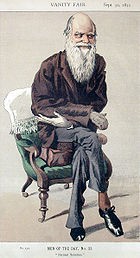3.1 Political Interpretations
Darwin’s theories and writings, combined with Gregor Mendel’s genetics (the “modern synthesis”), form the basis of modern biology. However, Darwin’s fame and popularity led to his name being associated with ideas and movements which at times had only an indirect relation to his writings, and sometimes went directly against his express comments.

Darwin was interested by his half-cousin Francis Galton’s argument, introduced in 1865, that statistical analysis of heredity showed that moral and mental human traits could be inherited, and principles of animal breeding could apply to humans. In “The Descent of Man” Darwin noted that aiding the weak to survive and have families could lose the benefits of natural selection, but cautioned that withholding such aid would endanger the instinct of sympathy, “the noblest part of our nature”, and factors such as education could be more important. When Galton suggested that publishing research could encourage intermarriage within a “caste” of “those who are naturally gifted”, Darwin foresaw practical difficulties, and thought it “the sole feasible, yet I fear utopian, plan of procedure in improving the human race”, preferring to simply publicise the importance of inheritance and leave decisions to individuals.
Galton named the field of study Eugenics in 1883, after Darwin’s death, and developed biometrics. Eugenics movements were widespread at a time when Darwin’s natural selection was eclipsed by Mendelian genetics, and in some countries, including the United States, compulsory sterilisation laws were imposed. Following the use of Eugenics in Nazi Germany it has been largely abandoned throughout the world.
Darwin did not share the then common view that other races are inferior, and regarded his taxidermy tutor John Edmonstone, a freed black slave, as a “very pleasant and intelligent man”. Regarding Fuegians, he “could not have believed how wide was the difference between savage and civilized man: it is greater than between a wild and domesticated animal, inasmuch as in man there is a greater power of improvement”, but he knew and liked civilised Fuegians like Jemmy Button.


Be First to Comment